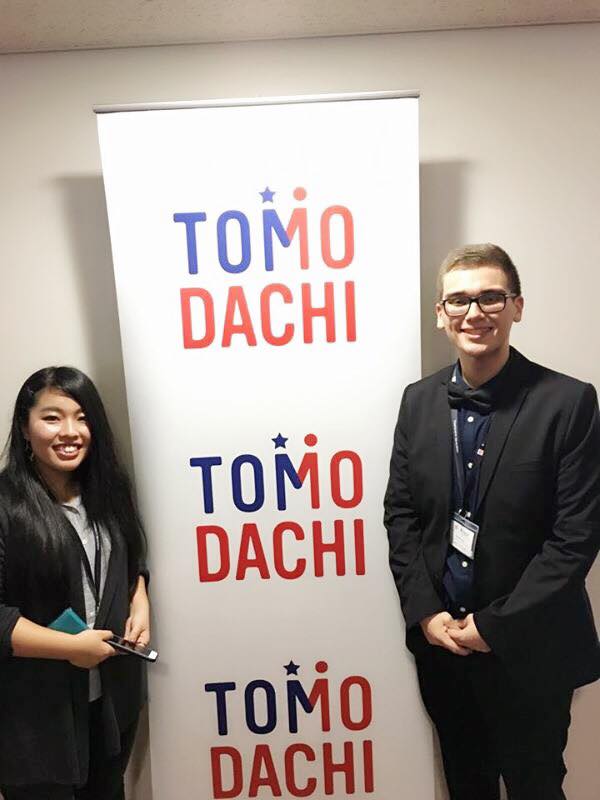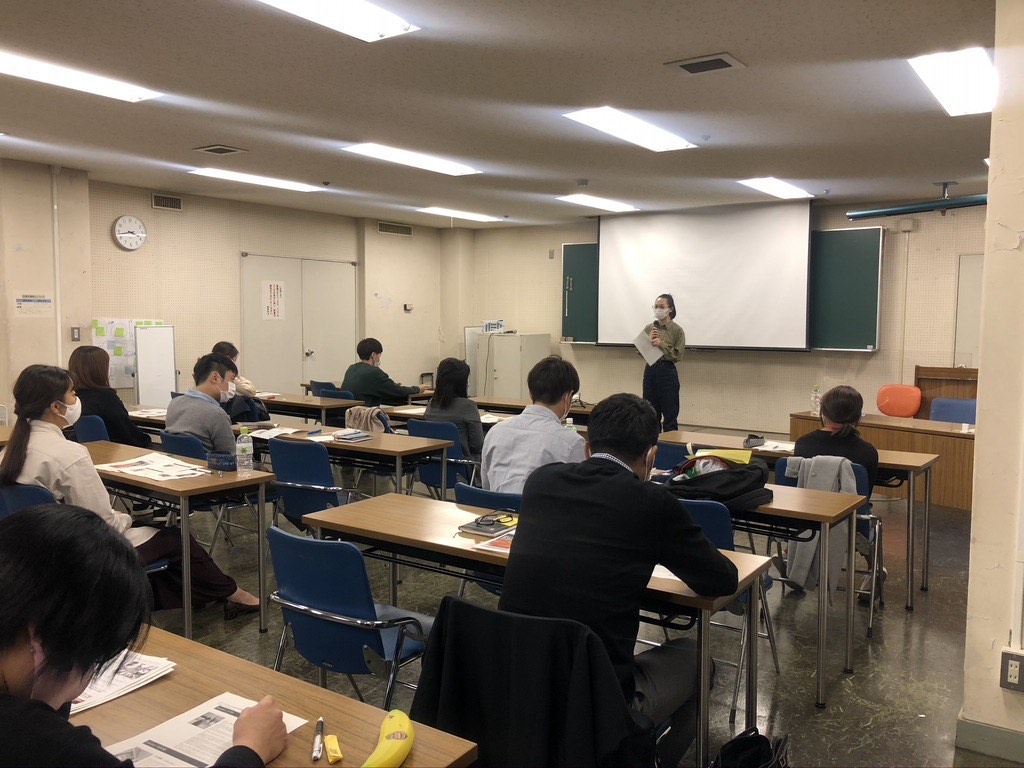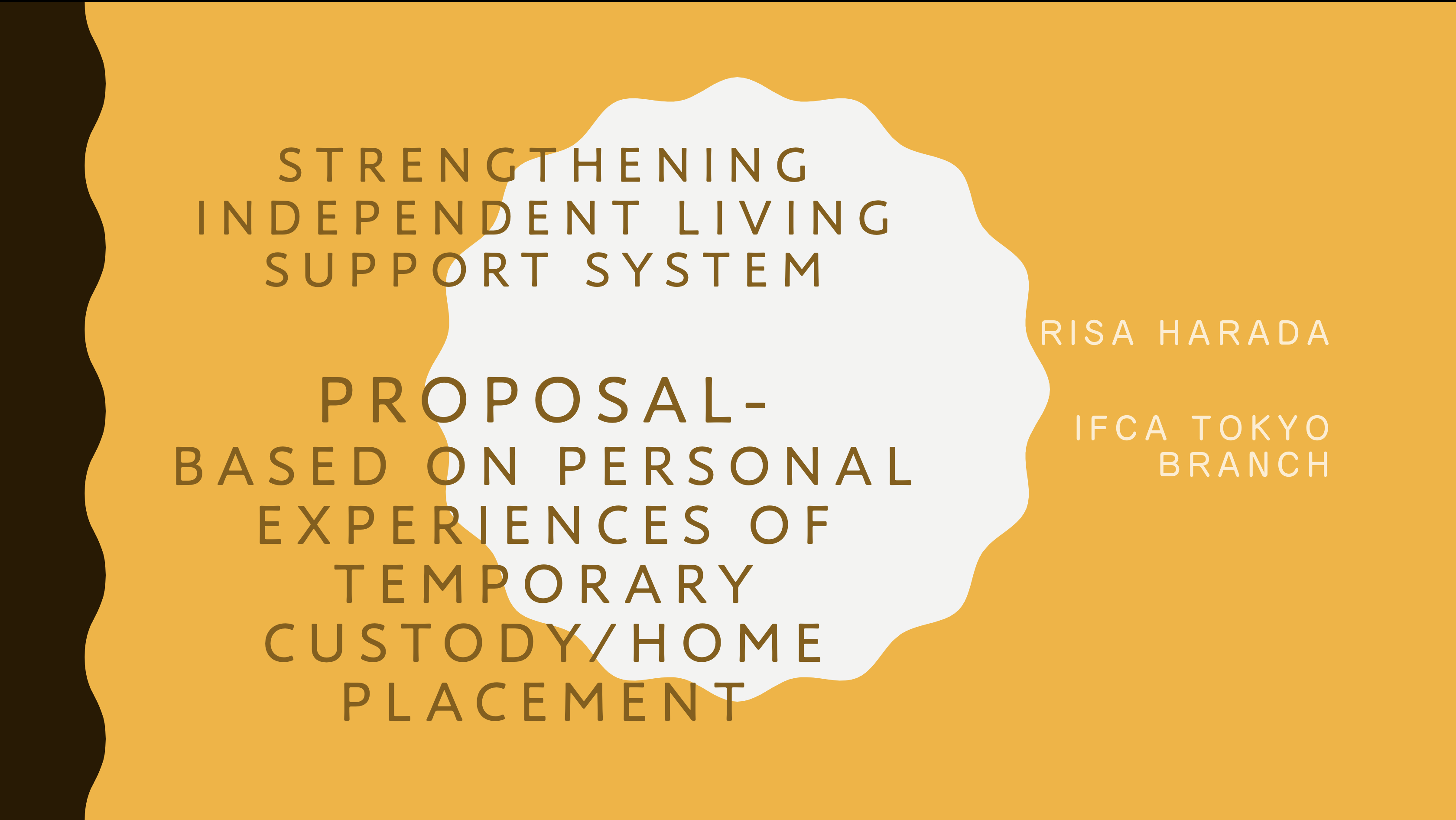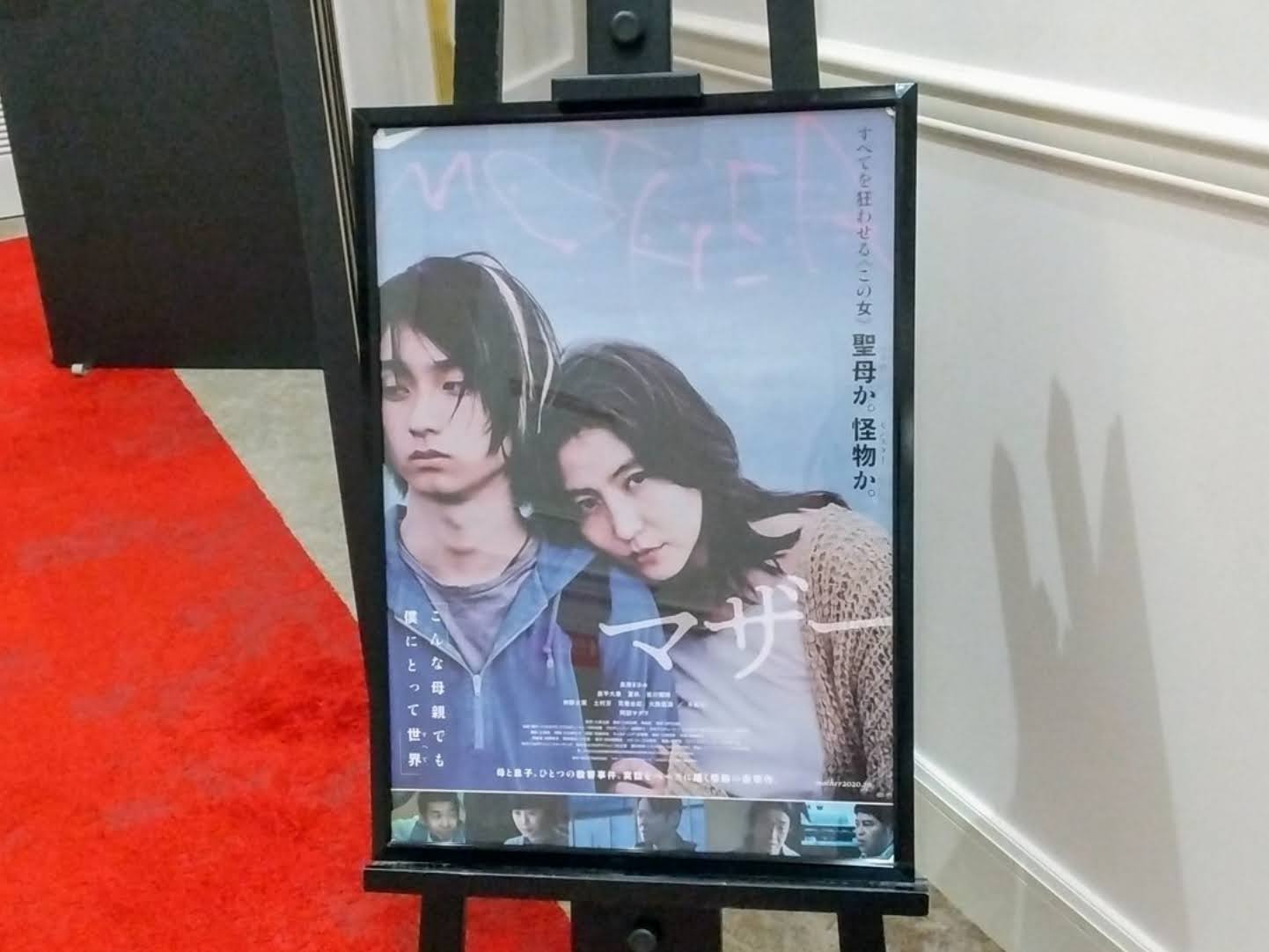Chihiro Sato
“Overview of Japanese foster care”
Hello everyone. My name is Chihiro Sato. I am an IFCA Japan Alumni Team member.
I joined IFCA in November last year. I am 20 years old. I go to college on scholarship and I have a part time job.
When I was 15 years old, I was brought to a child protection facility due to my parent’s abuse. I left the facility at age 19, and am currently living by myself at a place near my college.
At first, I have a favor for you all. I am not an English native speaker so I think sometimes my English is disagreeable to ear and sometimes I cannot comprehend English. I will do my very best, however, I might have trouble with English so please note that.
First of all, I want to talk about an overview of Japanese foster care. Now in Japan, there are approximately 47,600 children living in foster care and of those children, more than half, approximately 30,000 children, live in child protection facility. The reasons for entering foster care varies, however, most are due to abuse and neglect.
The types of Japanese foster care placements are ”baby nursery home” and “child protection facility” (which we call Yogoshisetsu in Japanese) and *independent support home*. “baby nursery home” is a facility that brings up babies whose parents have difficulty taking care of the baby at the home. In Japan, there are about 130 baby nursery homes, and approximately 3,000 babies live in these facilities. A “child protection facility” houses Children ages 3 to 18. In Japan, there are about 600 child protection facilities, and approximately 30,000 youth live in these facilities. In Japan, most children whose parents cannot care for them properly live in group facilities rather than foster homes. Currently, about 89% of foster children live in group facilities, whereas 11% live in foster homes. These numbers are quite different between Japan and the United States. Finally Independent support homes are homes that youth can pay to live in to receive support as they transition out of foster care, if they are not going to school.
“My experience”
In my speech today, I would like to talk about my experience of mental health care. When I lived in the facilities, I received mental health support many times to treat my PTSD symptoms.
When I look back my life now, my life was extraordinary. My father was extremely verbally and physically abusive, all the time. Looking back, I lived like a slave. Sometimes, my father hit me with golf club and dashed my head against the desk. Moreover, one day suddenly my father became angry and forcibly shaved my hair. Then I had a bald head.
I continued such a life for 15 years, so I suffered from PTSD symptoms immediately after being brought to the facility. At that time, my everyday life was hard and distressing for me, so I always thought about committing suicide. My facility staff had a great concern for me so I started receiving mental health care. At first, I had counseling with a psychologist who worked at the facility once per two weeks. However, due to my severe PTSD symptoms, I also saw my psychiatrist, and he prescribed me sedatives and sleeping pills.
My psychologist helped me enthusiastically. She taught me how to cope with trauma, how to escape from flashback without engaging in self harm and the like, she found the solution to my PTSD symptoms one by one.
My symptoms could not be improved in the first three months, but as time passed by one year, the number of flashback decreased and my PTSD symptoms improved. I could sleep without sleeping pills and I could live my everyday life without sedatives.
After overcoming my PTSD symptoms, I felt like I could finally stand on my own feet. Of course, things were not perfect, and I had to continue counseling with my psychologist to keep them from reoccurring. This was the first time in my entire life, however, that I could live without the terror my father had inflicted upon me. I was really looking forward to starting my new life.
However, my happy life did not continue for long. On March 11th, 2011, the big earthquake struck Japan. And my grandparents were taken from me by the tsunami. For me, my grandparents were my reason for living. I went to grandparent’s house every winter and summer vacation. They were elderly, and I spent time helping them with housework and errands.
When I visited my grandparent’s house they always gave me a big hug and called me by my name and made me more food than I could ever eat. We took walks together, took naps together, and my grandmother taught me how to knit. When we were together, our time was always filled with love and joy. I never had these things from my parents, so I loved my grandparents so much for giving me this love and support.
Anytime I was having a hard time, I always thought about my grandparents, and that gave me strength to keep going.
Two weeks before the earthquake, I was talking to my grandparents on the phone. That was the first time that we had talked on the phone since I left my parents and entered the facility. My grandparents apologized to me for not noticing that my father was abusing me. I told them not to worry, but it wasn`t how I truly felt. I didn`t want to make them worry, and so I lied and said I was ok. That was the last time I ever spoke to them.
When the earthquake struck Japan, Japan was sent into a panic and information was very confusing. The government couldn`t accurately report on the casualties, but the news reported on the tsunami, constantly showing footage of tsunami victims. When I saw the news footage, I was shocked, surprised, and scared. My PTSD symptoms began to return and I felt panicked. At this time, my psychologist tried to pull me back from my PTSD symptoms, and she resumed the same treatment as when I first entered facility sleeping pills and sedatives.
My psychologist kept telling me that it was ok, and that I could overcome those feelings again. However, this time, the treatment was not effective because I was constantly reminded of the tsunami every where I went. I had to take the train to school, and there were advertisements and newspapers every where I looked that talked about the tsunami. It was my grandparent`s dream for me to graduate from high school, but I was afraid to leave my home.
After the earthquake struck, I started calling my grandparent`s house constantly. I left voicemails on the community voicemail because the phone lines were not functioning, hoping that they would hear my message and tell me they were ok. I didn`t have a cell phone at the time, so I had to borrow the facility phones. The rule in the facility was that children could not use the phone for personal use, but I begged so many times that they let me use it. This continued for one month until an incident occurred when I asked to use the facility phone, but the facility staff told me I was being annoying. Their next words surprised me they told me that leaving a message for my grandparents didn`t work and was simply a meaningless act. They said: “You can`t find your grandparents by just making a phone call, and we are too busy, don`t disturb us with this meaningless request.“ However, at this time, my psychologist had told me that I should leave a message for my grandparents if this was a comfort to me, because it helped manage PTSD symptoms. My psychologist told the facility staff to let me keep calling, but my facility staff ignored her request. They didn’t help me in any way and they took away my hope.
Five months after the earthquake struck, my mental health was growing worse and worse. Then, one day in August, my social worker came to my facility and said: “I have bad news for you, your grandparent`s bodies were found in the rubble”. When I heard this, I started to cry for the first time since the earthquake. Until this time, I had believed that a miracle would happen and that my grandparents were alive. It was devastating to learn the truth.
Now, four years after the earthquake, I have overcome many of my PTSD symptoms with the help of my psychologist and the support of others. It is not perfect, but I think I’m ok. Still, I think I will never forget the feelings of loss, nor will I forget my facility staff’s actions.
Now, I have a few recommendations:
– If foster youth have mental health support, it should not only involve professional treatment, but we also need the support from those around us. Of course professionals provide the best treatment to their patients, but the most important thing is to keep the treatment environment when a youth returns home or to the facility. It is important for caregivers to be involved in this support, so that treatment can be consistent no matter where the youth is.
– Caregivers should never make symptoms worse. Not all caregivers study mental health, so it is important for psychologists to teach these skills to caregivers and youth. Caregivers should be involved in the treatment plan, and should be taught what to do and what not to do to support youth in recovery.
– I am an alumni of care, so I am not a mental health professional. However, I think that the earthquake struck, if psychologists and
facility staff had worked together, maybe I could have stayed healthy. I did not share my story because I want pity for any of you, I shared it because I don’t want another foster youth to go through what I did.
Conclusion
– Thank you very much for giving me the opportunity to share my story and opinions to you professionals. My hope for the future is that I can become a psychologist some day to help foster youth overcome their trauma. I hope that my background and my past inspires you to do the same. Arigato gozaimashita
*This speech was written for the APSAC (American Professional Society for the Abuse of Children) Congress held in Boston, MA, in 2015.








Leave a Reply